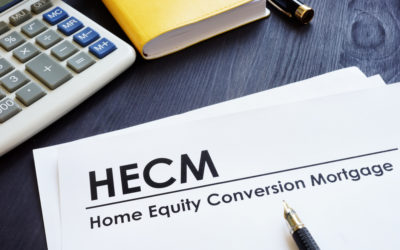A reverse mortgage gives eligible homeowners the ability to stay in their homes for as long as possible. However, life happens, and borrowers and their heirs may wonder whether it’s possible to sell a home with a reverse mortgage—also known as a home equity conversion mortgage (HECM)—attached to the property.
If you’re planning on selling a house with a reverse mortgage, there are several important details you should be aware of before initiating the process.
Here are our top five tips for selling a HECM-attached property so you can prepare for a smooth and seamless transaction. Click on a link to navigate to a section below:
Can you sell a house with a reverse mortgage?
Yes; similar to traditional mortgages, borrowers with reverse mortgages have the option to sell the home whenever they’d like. Generally speaking, the listing and selling process of a home with a reverse mortgage is comparable to standard residential real estate transactions, but there are certain timelines, special requirements, and unique issues borrowers should take into consideration. Most importantly, once you sell a house with a reverse mortgage, you will be required to pay back the loan in full with the proceeds from the sale.
To determine the viability of a home sale, it’s important to understand how a reverse mortgage works. Reverse mortgage borrowers still retain ownership of their home, but a lender places a lien against the property which entitles them to repayment. Borrowers are not required to make installment payments towards their principal balance until the loan matures and becomes due and payable. However, if a borrower uses their right to sell the home at any time, they must settle the lien and repay any funds received from the reverse mortgage as part of the process.
How do you sell a house secured by a reverse mortgage?
Whether a borrower has passed, moved out of the home and into a nursing facility, or simply desires to relocate, it’s important to note how a reverse mortgage affects the sale of the property. Remember, if you decide to sell your home, you will be required to pay back the mortgage and that amount will be taken from your total equity. Your lender should clarify the stipulations regarding the sale of your home during the reverse mortgage application process.
If you’ve decided selling a home with a reverse mortgage makes sense for your financial goals, follow these steps:
- Contact your reverse mortgage lender for a quote
- Enlist the help of a real estate agent who can help sell your property at the best price
- Apply the proceeds of the transaction to settle the loan balance
Tips for Selling a House with a Reverse Mortgage
Tip #1: Be Prepared to Settle the Loan
If you’re selling a house with a reverse mortgage, be prepared to settle the loan with the proceeds of the transaction.
According to the US Department of Housing and Urban Development (HUD), who oversees the federally-insured HECM program, borrowers retain the ability to sell the property whether or not the loan is due and payable. If the loan has not yet matured, the property must be sold for at least the current appraised value in order to satisfy the mortgage. Once the property is sold, the loan is settled, and the account is closed, the borrower may keep any remaining equity.
In the event that the HECM does reach a maturity event and becomes due and payable, the borrower may sell the property for the lesser of the outstanding loan balance or 95 percent of the appraised value (the remaining five percent is set aside for “customary and reasonable closing costs”). When the borrower sells the property but the sale proceeds are insufficient to satisfy the mortgage, it’s referred to as a “Borrower’s Short Sale”.
Tip #2: Never Pay More Than the Home is Worth on Your Loan
HECMs are non-recourse loans insured by the Federal Housing Administration (FHA), which means that borrowers (and their surviving heirs) will never be forced to pay more than the home is worth. If you’re interested in selling a home with a reverse mortgage, but the real estate market has “sunk” and your loan balance is higher than the property value, you will only be responsible for repaying 95 percent of the home’s appraised value. A lender cannot seek debt repayment through other assets aside from the home.

If you are considering selling a home with a reverse mortgage, use the appropriate FHA appraisal form to learn the value of your property and compare it against your loan balance. Mortgagees must obtain an appraisal of the property no later than 30 days after:
- Providing notice that the reverse mortgage is due and payable
- The mortgagor, their estate, heir, or another legal entity requests an appraisal in connection with a pending sale
- The mortgagee becomes aware of the death of the last surviving borrower
Tip #3: Get a Quote on Your Equity
Contact your reverse mortgage lender to get a quote on how much equity you have, how much you owe, and what that will leave you with after the sale of your home. Quotes can expire so be sure to get this number in writing.
Tip #4: Talk with the Heirs of the Home
Heirs handling a reverse mortgage after the death of the last surviving borrower have several options to settle the loan:
- Heirs may choose to hold onto the home by paying off the loan balance.
- If the heirs do not want to keep the property, they may sell the house with a reverse mortgage to settle the debt.
- To walk away from the property without financial obligation, heirs may choose to deed the home back to the lender with a Deed-in-Lieu.
If an heir inherits a reverse mortgage after death, they may satisfy the mortgage by selling the home to repay the loan with the proceeds, and they will never be required to pay more than the sale price of the home, so long as the home sells for at least 95 percent of the current appraised value. FHA insurance will cover any shortfall to protect the lender.
Heirs who are not interested in selling the house with a reverse mortgage may be able to pay off the required 95 percent by obtaining a traditional mortgage, but this requires planning. It’s encouraged to have a conversation with your family in advance to prepare for future financial decisions.
After the passing of the last surviving borrower, the property securing the HECM may be sold regardless of the presence of a non-borrowing spouse. According to HUD, “Nothing in Mortgagee Letter (ML) 15-15 may be construed as interrupting or interfering with the ability of the borrower’s estate or heir(s) to dispose of the property if they are otherwise legally entitled to do so.”
Heirs are responsible for getting the home appraised no later than 30 days after the due and payable notice is sent. Within two to six months, they must choose whether or not to sell the home with a reverse mortgage. The estate may be eligible for two three-month extensions, subject to HUD approval, in order to decide whether to sell the property or repay the loan balance.
Getting Started with Reverse Mortgages
If you’re looking to get started with a reverse mortgage, these articles can help guide you through all aspects of the process.
Guide to HECM Loan Reverse Mortgage Limits
Tip #5: Continue to Make Home Repairs
For a fast sale at the best price, be sure to make any and all necessary repairs to your property prior to listing it on the market.

Reverse mortgage solutions allow eligible homeowners (62+) to convert their home equity into cash in the form of loan proceeds without the burden of monthly payments. Both borrowers and heirs have the freedom to apply the proceeds of the sale of the home to satisfy the mortgage. When contemplating your choices, keep these five tips in mind:
KEY TAKEAWAYS
- Understand the lien placed on your home before deciding to sell.
- Remember that if your reverse mortgage becomes due and payable, you’ll never owe more than 95 percent of the current appraised value or your outstanding loan balance, whichever is less.
- Your lender will provide you with a quote for what proceeds will remain after the sale of your home but this estimate may expire.
- Heirs who would rather keep the property than sell the home with a reverse mortgage may be able to secure alternative financing.
- Ensure your home is maintained up to FHA housing standards prior to listing your property on the market.
KEY TAKEAWAYS
- Understand the lien placed on your home before deciding to sell.
- Remember that if your reverse mortgage becomes due and payable, you’ll never owe more than 95 percent of the current appraised value or your outstanding loan balance, whichever is less.
- Your lender will provide you with a quote for what proceeds will remain after the sale of your home but this estimate may expire.
- Heirs who would rather keep the property than sell the home with a reverse mortgage may be able to secure alternative financing.
- Ensure your home is maintained up to FHA housing standards prior to listing your property on the market.
If you’re contemplating a reverse mortgage and would like to learn more about how it could benefit your retirement, contact a helpful reverse mortgage specialist at GoodLife® or click on the link below. We look forward to answering any of your outstanding questions and explaining how you may be able to use this financing tool as a means to live out your retirement more comfortably.

 1-866-840-0279
1-866-840-0279


